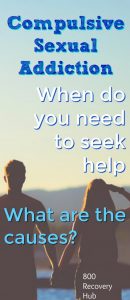Sex and Love Addiction
Yes, love and sex can be addictive and as destructive to relationships as compulsive substance abuse. The high hinges on physical or psychological arousal and relationships can be marked by desperation. Love addicts go through life with desperate hopes and constant fears. Fearing rejection, pain, unfamiliar experiences, and having little faith in their ability or right to inspire love, they wait and wish for love, perhaps their least familiar real experience. The sex addict follows a routine or ritual leading to acting out on  desires and is then fraught by feelings of denial then shame, despair, and confusion.
desires and is then fraught by feelings of denial then shame, despair, and confusion.
Sexual Addiction is like most other compulsive behaviors: a destructive twist on a normal life-enhancing activity. Defining sex addiction depends on less on the behavior itself than on the person’s motivation. People who suffer from sexual addiction typically lack the ability to control or postpone sexual feelings and actions, with the need for arousal often replacing the need for intimacy. Eventually, thrill-seeking becomes more important than family, career, even personal health, and safety.
Addiction can be mental or physical
Addiction is characterized by the repeated, compulsive seeking or use of a substance or activity despite negative social, psychological and/or physical consequences. It is often (but not always) accompanied by physical dependence, withdrawal syndrome, and tolerance. Withdrawal consists of a predictable group of signs resulting from the abrupt removal of, or a rapid decrease in the dosage of, a psychoactive substance or activity. The syndrome is often characterized by overactivity of the physiologic functions that were suppressed by the drug and/or depression of the functions that were stimulated by the object of addiction.
Signs of Sexual Addiction
•Preoccupation: continual fantasies about sexual prospects or situations, which can trigger episodes of sexual “acting-out”
•Ritualization: a preferred sexual activity or situation is often stereotyped and repetitive
•Compulsion: continual engagement in sexual activity despite negative consequences and desire to stop
•Despair: guilt or shame over inability to control behavior or feel remorse
•Other behavioral problems, particularly chemical dependency and eating disorders
Signs of Love Addiction
•Is all-consuming and obsessive
•Is inhibited
•Avoids risk or change
•Lacks true intimacy
•Is manipulative, strikes deals
•Is dependent and parasitic
•Demands the loved one’s devotion
Hypersexuality – Compulsive Behavior with Sexual Addiction
From the Mayo Clinic
Compulsive sexual addiction behavior is sometimes called hypersexuality, hypersexual disorder, nymphomania or sexual addiction. It’s an obsession with sexual thoughts, urges or behaviors that may cause you distress or that negatively affect your health, job, relationships or other parts of your life.
Compulsive sexual addiction behavior may involve a commonly enjoyable sexual experience (for example, self-stimulation) that becomes an obsession and becomes disruptive or harmful to you or others.
Other compulsive sexual behaviors are outside the bounds of commonly accepted conduct (for example, paying for sex or having extramarital affairs) and cause distress. And these behaviors could have negative consequences.
No matter what it’s called or the exact nature of the behavior, untreated compulsive sexual behavior can damage your self-esteem, relationships, career and other people. But with treatment and self-help, you can manage compulsive sexual behavior and learn to manage your urges.
Compulsive sexual behavior symptoms
These vary in type and severity. Some indications that you may be struggling with compulsive sexual behavior include:
- Your sexual impulses are intense and feel as if they’re beyond your control
Even though you feel driven to do certain sexual behaviors, you may or may not find the activity a source of pleasure or satisfaction - You use compulsive sexual behavior as an escape from other problems, such as loneliness, depression, anxiety or stress
- You continue to engage in sexual behaviors that have serious consequences, such as the potential for getting or giving someone else a sexually transmitted infection, the loss of important relationships, trouble at work, or legal problems
- You have trouble establishing and maintaining emotional closeness, even if you’re married or in a committed relationship
When to see a doctor for Sexual Addiction
Seek help if you feel like you’ve lost control of your sexual behavior, especially if your behavior causes problems for you or other people. Compulsive sexual behavior may escalate over time, so get help when you first recognize there may be a problem.
As you decide whether to seek professional help, ask yourself:
- Can I manage my sexual impulses?
- Am I distressed by my sexual behaviors?
- Is my sexual behavior hurting my relationships, affecting my work or resulting in negative consequences, such as getting arrested?
- Do I try to hide my sexual behavior?
Seeking help for a sexual behavior can be difficult because it’s such a deeply personal matter. Try to:
- Set aside any shame or embarrassment and focus on the benefits of getting treatment.
- Remember that you’re not alone — many people struggle with compulsive sexual behavior.
Mental health providers are trained to be understanding and discreet. But not all mental health experts are experienced in treating compulsive sexual behavior, so make sure you find a treatment center or therapist who is competent in this area.
Keep in mind what you say to a doctor or counselor is kept confidential. The only exception is in cases where you report that you’re going to hurt yourself or someone else. Also, this is true if you report sexual abuse of a child, or you report abuse or neglect of someone in a vulnerable population.
Seek immediate treatment if:
- You think you may cause harm with uncontrolled sexual behavior
- You have bipolar disorder or other problems with impulse control, and you feel like your sexual behavior is slipping out of control
- You are suicidal — if you’re thinking of attempting suicide, call 911 or your local emergency number, or the National Suicide Prevention Lifeline (in the United States) at 1-800-273-TALK (1-800-273-8255)
Sexual Addiction Causes
Although the causes of compulsive sexual behavior are unclear, they may include:
An imbalance of natural brain chemicals. Certain chemicals in your brain (neurotransmitters) such as serotonin, dopamine, and norepinephrine help regulate your mood. High levels may be related to compulsive sexual behavior.
Conditions that affect the brain. Certain diseases or health problems may cause damage to parts of the brain that affect sexual behavior. Epilepsy, Huntington’s disease, and dementia have all been associated with compulsive sexual behavior. In addition, treatment of Parkinson’s disease with some dopamine agonist medications may cause compulsive sexual behavior.
Addiction and the brain
Changes in brain pathways. Compulsive sexual behavior may be an addiction that, over time, might cause changes in the brain’s neural circuits — the network of nerves that allows brain cells to communicate with one another. These changes may cause pleasant reactions by engaging in sexual behavior and unpleasant reactions when the behavior is stopped.
